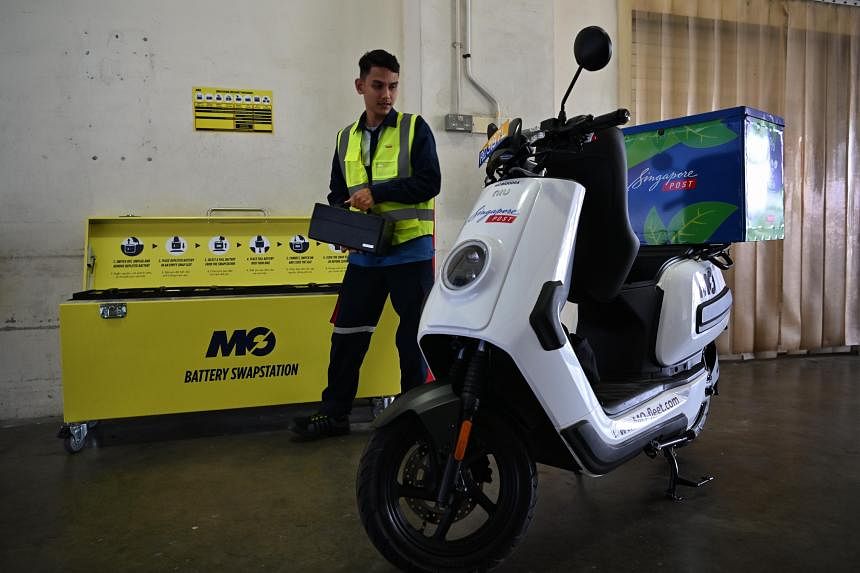SINGAPORE - The Republic’s plan to lower carbon emissions through electrification has hit a road bump as one of the two companies trialling battery swopping technology for electric motorcycles is shelving plans to make it available commercially.
Due to high costs and the complexity of setting up the business to be commercially viable, Mo Batteries will not proceed to launch a battery swopping service for electric motorcycles in 2024 as planned. This comes after a year of testing under a Land Transport Authority (LTA) scheme, The Straits Times has learnt.
In July 2023, five months after it started the trial, Mo Batteries told ST it was expecting to start commercial operations by the first half of 2024, after the end of the trial.
The company, which is based in Singapore, was the first of two to test battery swopping for electric motorcycles, starting in February 2023. Taiwanese company Gogoro started its test in March 2023.
The special permissions came after the national electric vehicle (EV) charging standards were updated in 2022 to include battery swopping for motorcycles. This makes it possible for companies to operate such services commercially when they fulfil all requirements.
Gogoro has extended the trial by six months and is slated to exit the sandbox by September, LTA said. “They are currently on track to obtain type approval for their chargers,” the authority added. This would allow the chargers to be used commercially.
By the end of Mo Batteries’ trial in February, its fleet of six electric motorcycles covered 12,000km and completed 400 battery swops. The motorbikes can travel between 90km and 120km before each battery change.
The company got a few fleet vehicle users to use the electric motorcycles for two to three months each to get their feedback and test whether the battery swopping solution was able to fit their specific needs.
The first test kicked off in February 2023 with national postal service SingPost, which used two electric motorcycles to deliver mail for three months. Other parties in its trial included security services provider Certis and the Sentosa Development Corporation (SDC).
During the trial, the batteries were charged centrally at Mo Batteries’ office and delivered to the participating companies’ locations. SingPost and Certis confirmed they had completed the trial, and SDC said it will explore leasing electric motorcycles with swoppable batteries when it next renews its vehicle fleet. At present, 44 per cent of SDC’s fleet are electric, including 14 beach trams and 33 buggies.
Mr Tom Streitberg, Mo Batteries’ co-founder, said in a phone interview in March 2024 that the licensing regime to certify the chargers, batteries and the electric motorcycles with the swopping technology was “robust and provides a high degree of safety”.
During the trial, Mo Batteries learnt how the vehicles and battery swops worked in actual situations, as well as the practical requirements of the three companies.
However, the company is not prepared to take the next step of commercialising the service because complying with the requirements needed significant time and investment.
After the test period, the companies have to get all the necessary approvals before they can proceed to commercialise their service.
The requirements include getting the licence to operate an EV charging service, and separate approvals for battery charging equipment and electric motorcycles. Permits are also needed for the location of the approved charging equipment.
Gogoro is partnering Jardine Cycle & Carriage to provide 20 electric motorcycles for riders on food delivery platform foodpanda.
The battery swop stations used by Gogoro, which look like a vending machine, charges the empty batteries when the riders return them. So, there is no need to transport the exhausted batteries to a centralised location, like in the Mo Batteries trial.
Automotive experts said battery swopping technology is particularly useful for electric motorcycles, because the vehicles are too small to carry larger-capacity batteries that would allow them to travel farther on a single charge.
Electric motorcycles need two or three hours to charge their batteries for a range of around 100km. In contrast, the equivalent internal combustion motorcycle is not only cheaper, but also more convenient: Filling up the tank, which takes mere minutes, gives it a range of around 150km.
Battery swopping sidesteps the inconvenience of waiting, as the empty batteries can be switched for fully charged ones.
With the end of Mo Batteries’ trial, four of the six electric motorcycles it used have been returned to the local importer which the company leased them from.
The other two, which Mo Batteries owns, will be exported or scrapped. The office the company occupied at an industrial building in Commonwealth Drive near Queenstown is in the process of being vacated.
The remaining three employees will work from home or at co-working spaces. At the peak of the project, Mo Batteries had 13 staff. All but two were based in Singapore.
When asked, Mo Batteries did not disclose the cost of operating the trial.
EV batteries form “50 per cent to 60 per cent” of an electric motorcycle’s cost, said Mr Streitberg. He believes that battery prices must come down sufficiently for the adoption of electric motorcycles to accelerate.
The G2 electric motorcycle from Singapore company Quantum Mobility is priced at $10,500 before certificate of entitlement (COE). In contrast, a Yamaha Aerox 155, which is a popular combustion-engine motorcycle used for food delivery, costs less than $3,700 before COE.
Another concern for Mr Streitberg was the licence to operate an EV charging service, which is valid for three years. This is shorter than a typical vehicle leasing agreement of around five years in Singapore – a length of time needed to spread out the cost of the service.
With its commercialisation plans in Singapore scrapped, Mo Batteries will offer the fleet management software that it developed for the trial to EV fleet operators in places such as Indonesia, Malaysia, Vietnam and India. Not limited to electric motorcycles, the software enables fleet owners to deploy their EVs and maximise their battery range.
Even as Mo Batteries bows out, other companies are preparing to offer electric motorcycles with battery swopping capabilities in Singapore.
One of them is Mah, which has been in the local motorcycle distributorship business for 51 years. The company is planning to spend up to $1.5 million to install battery charging and swopping stations by 2027. The first two locations will be ready by May, when it will start to sell electric motorcycles from Chinese brand Niu.
Mah’s spokesman said that the company is starting on its shift towards electrification even though it does not expect the business to be profitable in the immediate term. He added that as there is no existing charging infrastructure to support electric motorcycles, the company has to start its own with the battery charge and swop solution.
The adoption of electric vehicles helps to lower the land transport system’s emissions, which account for 15 per cent of carbon emissions here. As at Feb 29, 0.2 per cent, or 279, of the motorcycle population of 143,477 in Singapore are electric.
Electric motorcycles, unlike electric cars and light commercial vehicles, are not entitled to tax incentives, which help to defray the higher cost of buying EVs.
Besides higher cost, Mr Rex Tan, president of the Singapore Motor Cycle Trade Association, said there are not many electric options from the well-known motorcycle brands. The need to spend hours charging the batteries to get about 100km of range further reduces the appeal of electric motorcycles without swoppable batteries.
Correction Note: This story has been edited for clarity.


